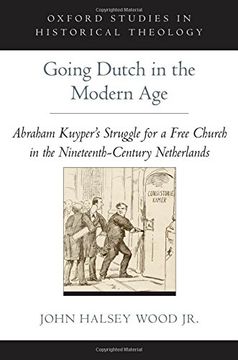Share
Going Dutch in the Modern Age: Abraham Kuyper's Struggle for a Free Church in the Netherlands (in English)
John Halsey Wood Jr. (Author)
·
Oxford University Press
· Hardcover
Going Dutch in the Modern Age: Abraham Kuyper's Struggle for a Free Church in the Netherlands (in English) - John Halsey Wood Jr.
$ 157.43
$ 196.79
You save: $ 39.36
Choose the list to add your product or create one New List
✓ Product added successfully to the Wishlist.
Go to My WishlistsIt will be shipped from our warehouse between
Monday, July 01 and
Tuesday, July 02.
You will receive it anywhere in United States between 1 and 3 business days after shipment.
Synopsis "Going Dutch in the Modern Age: Abraham Kuyper's Struggle for a Free Church in the Netherlands (in English)"
Abraham Kuyper is known as the energetic Dutch Protestant social activist and public theologian of the 1898 Princeton Stone Lectures, the Lectures on Calvinism. In fact, the church was the point from which Kuyper's concerns for society and public theology radiated. In his own words, ''The problem of the church is none other than the problem of Christianity itself.'' The loss of state support for the church, religious pluralism, rising nationalism, and the populist religious revivals sweeping Europe in the nineteenth century all eroded the church's traditional supports. Dutch Protestantism faced the unprecedented prospect of ''going Dutch''; from now on it would have to pay its own way. John Wood examines how Abraham Kuyper adapted the Dutch church to its modern social context through a new account of the nature of the church and its social position. The central concern of Kuyper's ecclesiology was to re-conceive the relationship between the inner aspects of the church--the faith and commitment of the members--and the external forms of the church, such as doctrinal confessions, sacraments, and the relationship of the church to the Dutch people and state. Kuyper's solution was to make the church less dependent on public entities such as nation and state and more dependent on private support, especially the good will of its members. This ecclesiology de-legitimated the national church and helped Kuyper justify his break with the church, but it had wider effects as well. It precipitated a change in his theology of baptism from a view of the instrumental efficacy of the sacrament to his later doctrine of presumptive regeneration wherein the external sacrament followed, rather than preceded and prepared for, the intenral work grace. This new ecclesiology also gave rise to his well-known public theology; once he achieved the private church he wanted, as the Netherlands' foremost public figure, he had to figure out how to make Christianity public again.
- 0% (0)
- 0% (0)
- 0% (0)
- 0% (0)
- 0% (0)
All books in our catalog are Original.
The book is written in English.
The binding of this edition is Hardcover.
✓ Producto agregado correctamente al carro, Ir a Pagar.

